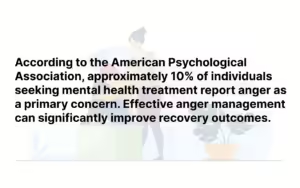Anger, while a natural emotion, can become a significant barrier to recovery and overall mental health when left unmanaged. In Boston, with its rich resources for behavioral health, individuals have access to numerous strategies and support systems to address anger constructively. If you or a loved one struggles with managing anger, this guide will introduce effective anger management techniques and available resources in Boston to promote lasting recovery.
Understanding Anger in Recovery
Anger often arises in the recovery process as individuals face past traumas, broken relationships, or the effects of addiction. While feeling anger isn’t inherently negative, the inability to control it can lead to strained relationships, relapse, or self-harm. That’s why incorporating anger management strategies into your recovery journey is vital.
Top Anger Management Techniques in Boston
- Cognitive Behavioral Therapy (CBT) CBT is a widely recognized approach for addressing anger issues. By helping individuals identify and change negative thought patterns, CBT provides tools for managing anger triggers effectively.
- Learn to recognize anger-inducing thoughts.
- Develop healthier responses to frustration.
- Work on long-term anger control strategies.
- Mindfulness and Relaxation Techniques Mindfulness involves focusing on the present moment, helping to reduce emotional reactivity. Techniques such as deep breathing, meditation, and progressive muscle relaxation can calm your mind and body, reducing anger intensity.
- Deep breathing exercises: Inhale for a count of four, hold for four, and exhale for four.
- Guided meditation apps to cultivate inner peace.
- Yoga practices offered at wellness centers in Boston.
- Dialectical Behavior Therapy (DBT) DBT is a specialized form of therapy designed to help individuals regulate emotions and reduce impulsive behaviors. It’s particularly effective for those whose anger leads to destructive actions.Learn more about Dialectical Behavior Therapy.
- Anger Journaling Writing down your thoughts and feelings can help you recognize patterns in your anger responses. Journaling provides insight into triggers and helps develop coping mechanisms.
- Record the situations that make you angry.
- Reflect on how you responded and what you could do differently.
- Physical Activity Exercise is a natural mood stabilizer. Activities like running, swimming, or even walking can release endorphins, helping to alleviate anger and stress.
- Join local Boston gyms or recreational centers.
- Participate in group fitness classes to combine physical activity with social connection.
- Family and Group Therapy Anger often affects relationships. Family therapy and group therapy provide safe spaces to communicate openly and resolve conflicts constructively.Discover our Family Therapy Program.
- Intensive Outpatient Programs (IOP) For individuals requiring structured support, IOPs offer therapy and skill-building sessions multiple times a week. This allows for focused work on anger management while maintaining daily responsibilities.Find out about our Intensive Outpatient Program.
- Acceptance and Commitment Therapy (ACT) ACT focuses on accepting emotions rather than fighting them, helping individuals build a life aligned with their values despite emotional challenges.Explore our Acceptance and Commitment Therapy program.
Local Resources for Anger Management in Boston
Boston is home to numerous mental health treatment centers and programs tailored to support individuals in their recovery journey.
- Mental Health Treatment Centers: Greater Boston Behavioral Health offers a range of services, including anger management, CBT, and IOP.
- Community Support Groups: Join local anger management or recovery support groups to share experiences and learn from others.
- Partial Hospitalization Programs (PHPs): For those needing intensive care without full hospitalization, PHPs provide structured therapy sessions.Learn more about our Partial Hospitalization Program.
Why Choose Greater Boston Behavioral Health?
At Greater Boston Behavioral Health, we understand that anger can be both a symptom and a cause of deeper mental health challenges. Our comprehensive approach includes:
- Personalized treatment plans.
- Evidence-based therapies like CBT and DBT.
- Supportive programs such as IOP and PHP.
- A compassionate team dedicated to your recovery.
Call us today at (888)278-0716 to start your journey to better behavioral health.
Frequently Asked Questions (FAQs)
1. How do I know if I need anger management therapy?
If your anger frequently leads to conflict, affects your relationships, or feels uncontrollable, professional therapy can help you manage it effectively.
2. Can anger management help with addiction recovery?
Yes, anger management is a crucial component of addiction recovery. It helps individuals cope with frustration, reducing the risk of relapse.
3. What types of therapy are available for anger management in Boston?
Therapies like CBT, DBT, and ACT are effective for anger management. These therapies are available at Greater Boston Behavioral Health.
4. Are there group therapy options for anger management?
Yes, group therapy provides a supportive environment to share experiences and learn anger management techniques.
5. How can I access anger management programs in Boston?
Contact Greater Boston Behavioral Health at (888)278-0716 or visit our Contact Us page to schedule an appointment.
Start Your Recovery Journey Today
Managing anger is a vital step in achieving lasting recovery and improving your overall well-being. With the right tools and support, you can transform your relationship with anger and build a fulfilling life.
Visit Greater Boston Behavioral Health to learn more about our services or call us today at (888)278-0716. Let us help you take the first step toward lasting recovery.


